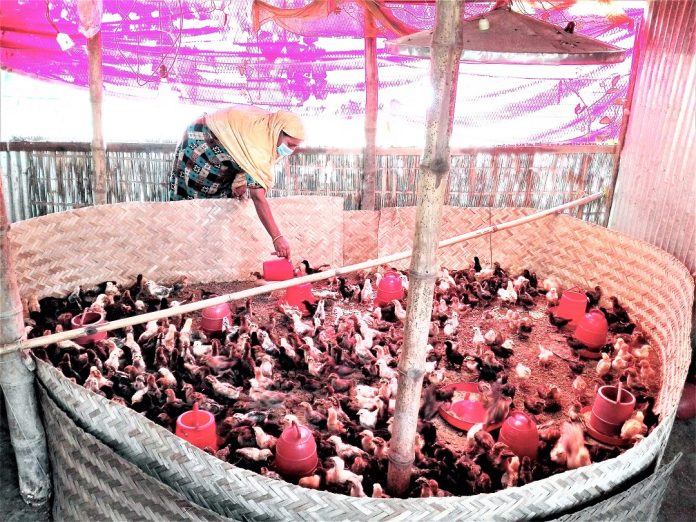Baby Begum, 33, has long known the face of extreme poverty. A mother of two sons and one daughter, she was already struggling to run the family with the irregular income of her van-puller husband, Shahjahan Ali, 37. The financial hardship even forced her son, only 13, to drop out from school and engage in child labour.
The Covid-19 pandemic worsened their financial condition further, when the household lost its income due to restrictions on movement.
It was then that she received BDT 8,000 from the project to set up a small poultry farm at her home and the necessary training on poultry rearing for free.
In just 35 days, she sold the first batch of her broiler for nearly BDT 4,500. It was only the beginning. Today, Baby is the proud owner of 600 Sonali chickens, which she bought with a portion of her profit as well as a flexible loan of BDT 10,000 from a partner organisation.
“I want to expand my farm further and rear 1,000 chickens. This will ease my hardship and I will then be able to support my children’s education,” she said.
But Baby is not alone. Many participants like her are now gradually scaling up their farm and off-farm IGAs they established with financial and technical support from the Prosperity project, which aims to lift 2,50,000 households out of extreme poverty by 2025.
Alongside providing livelihoods support, the project also works around nutrition and primary healthcare, linkage building with public and private service providers through community mobilisation, climate resilience building, women empowerment and disability inclusion.
As part of the livelihoods support, the project offers regular technical support during household visits by field staff who provide solutions to day-to-day issues such as IGA establishment, fodder management, vaccination, deworming as well as market linkage.
For additional support, participants are referred to and connected with local public and private service providers, with whom the project has already established linkage to ensure access to services by the extremely poor households.

Chapala Rani, 32, is another participant who expanded her small poultry farm with similar support. From Baby’s neighbouring union in Gaibandha, Chapala received 10 chickens and the necessary poultry shed from the project.
Equipped with the training on poultry rearing, she now has 32 chickens. Periodically, she sells the eggs as well as the chicken to support her family.
From the sale, she made a profit of BDT 3,000 which she invested to buy some ducks. With her profit gradually increasing, Chapala now plans to take a small loan to expand her farm.



